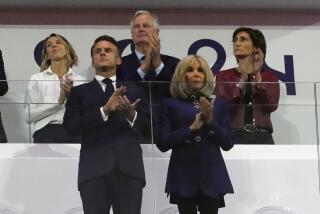Trading Guns for Bulldozers
To enter southern Lebanon these days, you drive down roads where traffic is directed by young men in gray Hezbollah civil defense corps T-shirts and past bulldozers from the Holy War Reconstruction Co.
Days after guns fell silent, Hezbollah has emerged as the lead player in the cleanup of towns and villages in southern Lebanon. It has the volunteers, owns the equipment and has spent years burnishing its image as the champion of ordinary people, from poor tobacco farmers to doctors and lawyers, who see Hezbollah as much more than a militia.
Men fighting Israeli troops a few days ago are working alongside the Lebanese Red Cross to pull bodies from the rubble.
Nowhere across this blasted, pitted landscape is there any sign of the Lebanese government, or its authority.
“There is no government here,” said an agitated Abdul Muhsen Husseini, president of the Union of Municipalities in the Tyre region -- the man who is supposed to be in charge -- as he handled requests from a stream of petitioners asking for money to buy medicine and what to do with the dead.
“We asked the government in Beirut to accompany the returning people to their villages, to repair water and prepare the roads,” he said. “They said to me, ‘God willing, we will come.’ And they didn’t come.”
The Lebanese army did cross the Litani River into southern Lebanon this morning.
In Beirut, the Cabinet issued a statement Wednesday saying it would “prevent the establishment of any authority outside the state” in southern Lebanon, and it pledged to restrict to the government the right to bear arms.
But on the ground in southern Lebanon, it is Hezbollah, emerging from a month of ferocious fighting with its health, education and civil services apparently intact, that calls the shots.
The civilian face of the Shiite Muslim militant group reemerged quickly after the cease-fire began Monday, when the business of cleaning up from war supplanted the carnage of its prosecution.
“We are not terrorists,” said Faras Jamil, 39, a restaurant owner who was helping clean up a community center in this Shiite border town, its crumbled stones tinged with what residents said were streaks of an Israeli soldier’s blood.
“My wife is Hezbollah. My children are Hezbollah. Hezbollah is all the people from this town.”
Even as government officials complain that they are expected to clear shattered towns with nothing but shovels and a few bulldozers, Hezbollah already owns or is in the process of renting the required machinery.
Most important, Hezbollah can draw on the manpower needed to begin the massive reconstruction.
Those factors present a serious challenge to the central government in Beirut and the Bush administration, which is scrambling to launch its own rebuilding effort and deny Hezbollah a public relations dividend.
In Aita Shaab, a still-smoldering ruin that is home to 10,000 people across the valley from Israel, a Hezbollah member in a Firestone cap moved through the streets Wednesday with a video camera to record the condition of each of the town’s 700 houses.
His survey divided them into buildings that had been destroyed and those with limited damage; he said Hezbollah construction officials would decide whether to fix or rebuild each house.
“That one has limited damage,” said Abu Hassan, pointing to a two-story house with gaping holes in the walls and tipping precariously to one side. But he categorized 85% of the houses in Aita Shaab as destroyed. And that is one town. Southern Lebanon is a travelogue of destruction: town after town pummeled by bombs and mortars that left them in shambles.
The destruction will present an expensive bill for Hezbollah leader Sheik Hassan Nasrallah, who has promised to rebuild every shattered house and pay each displaced family’s rent for a year while the rebuilding takes place. Families of those who were killed will receive payments for life, Hezbollah members say.
There was no evidence this week of the reports that Hezbollah will hand out cash -- $10,000 is the rumored amount -- to families left homeless.
It is unclear where the money will come from, but the Bush administration has accused Iran of bankrolling the group for years. Iran denies the charge.
Critics portray Nasrallah’s offering as a balm to the civilian victims of this war to stave off a political backlash from those who have seen friends and family killed in the bombardment that Israel said was aimed at suppressing Hezbollah rocket fire.
But even critics acknowledge Hezbollah’s savvy strategy.
“I was not surprised [by this tactic] because I have seen them do it before after previous wars in 1993 and 1996,” said a senior U.N. observer in the south who did not want to be quoted by name. “And they will do it again: Rich Shiites from outside Lebanon will fund it. And Hezbollah has the manpower.”
Hezbollah’s ability to shift from war to reconstruction has impressed outside observers.
“The guys come out after the war and they are not smiling, not sad, not tired, just determined,” says Dr. Martial Ledecq, a Belgian serving in southern Lebanon with Doctors Without Borders. “Even the doctors are Hezbollah.”
In his office in Tyre, Husseini, the regional government official, begrudgingly credited Hezbollah and its Shiite allies in the Amal militia.
“At least they are on the ground helping,” he said. “If you call them at midnight, they come out to help. They are the government.”
More to Read
Sign up for Essential California
The most important California stories and recommendations in your inbox every morning.
You may occasionally receive promotional content from the Los Angeles Times.










